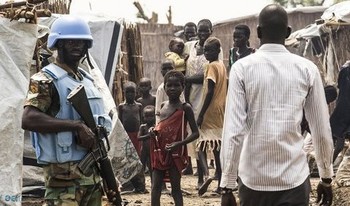Security Council renews UN peacekeeping mission in South Sudan

The UN Security Council on Thursday extended the mandate of the United Nations Mission in South Sudan (UNMISS) until 15 March 2019, demanding that parties end the fighting and signalling its intention to consider all measures, including an arms embargo, against those obstructing peace in the war-torn nation.
Unanimously adopting resolution 2406 (2018) under the United Nations Charter’s Chapter VII, the Council maintained overall UNMISS force levels at the troop ceiling of 17,000 — which includes a Regional Protection Force of up to 4,000 troops — and the police ceiling of 2,101 personnel.
The 15-member body demanded that South Sudan’s leaders implement the permanent ceasefire declared in the Agreement on the Resolution of the Conflict in the Republic of South Sudan, and other ceasefires for which they respectively called on 11 July 2016 and 22 May 2017.
To support the peace process, UNMISS would use its good offices and participate in the Ceasefire and Transitional Security Arrangements Monitoring Mechanism, with its Regional Protection Force authorized to use robust action to facilitate safe and free movement around Juba. More broadly, UNMISS would work to protect civilians, create conditions conducive to aid delivery and both monitor and investigate human rights abuses.
The Council extended the UNMISS mandate for three months on 14 December 2017, with its adoption of resolution 2392 (2017).
South Sudan’s ambassador to the United Nations, Moum Majak Ngor Malok, welcomed the mandate renewal, but lamented that the Council had chosen to politicize a peacekeeping resolution. “There is a need to bridge the discrepancy between the primary responsibility of the State and the complementary support of the international community,” he said.
He acknowledged that South Sudan was violently divided, but the leadership had been popularly elected. While it was practical to be connected to both parties, and to foster national consensus, the United Nations should work in collaboration with the Government. “It is one thing to condemn the leadership of the country and another to threaten the imposition of an arms embargo and sanctions,” which would only generate an adversarial relationship, he said.
The only solution to the conflict was through a political process, he went on to say, in which the President had already made numerous compromises.
He said UNMISS and the country team should discuss with the Government ways to use their strategic understanding as a basis for reaching out to the armed opposition.
The South Sudanese diplomat said the conflict in the world’s youngest nation was political, not ethnic, in nature.